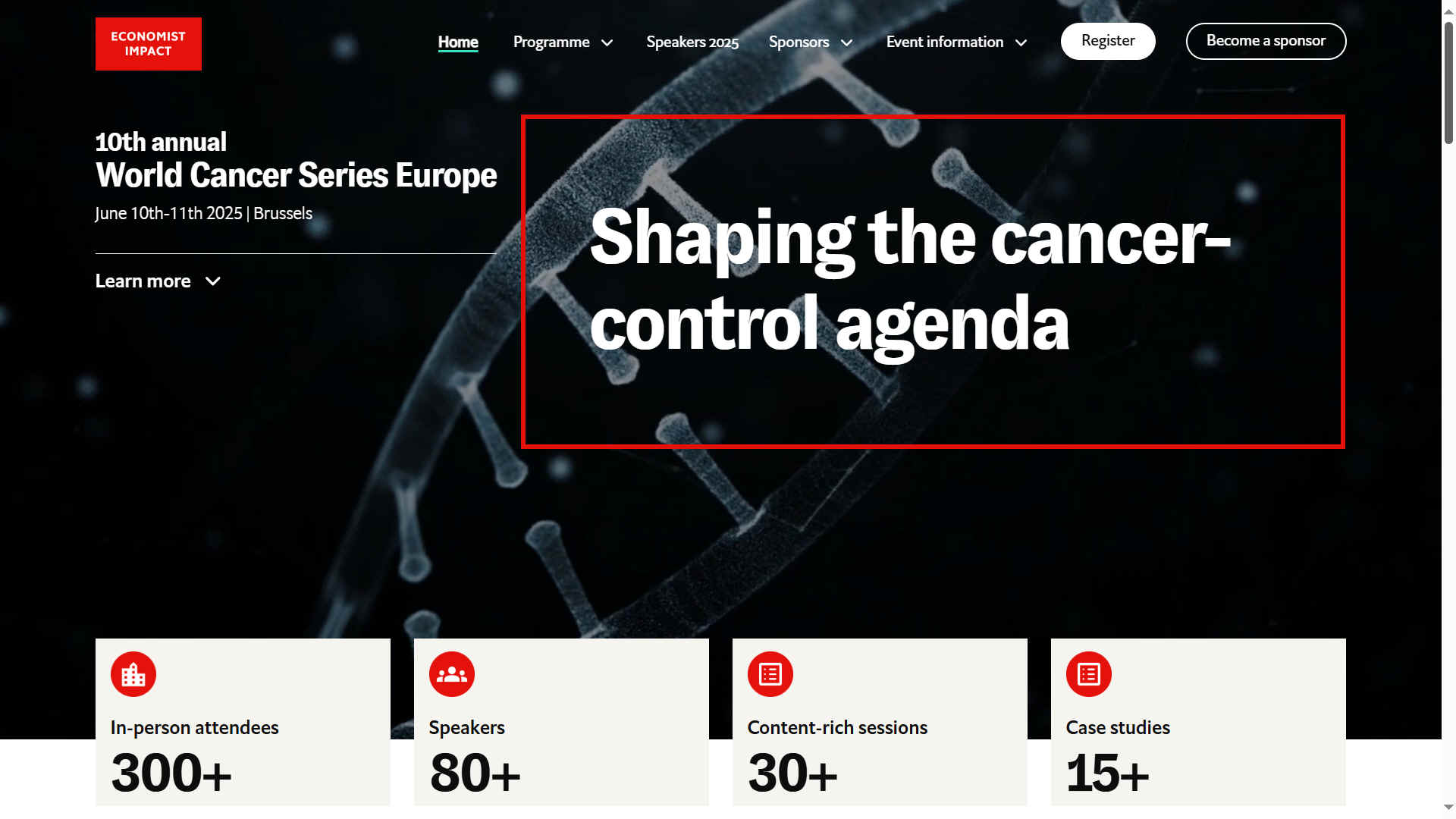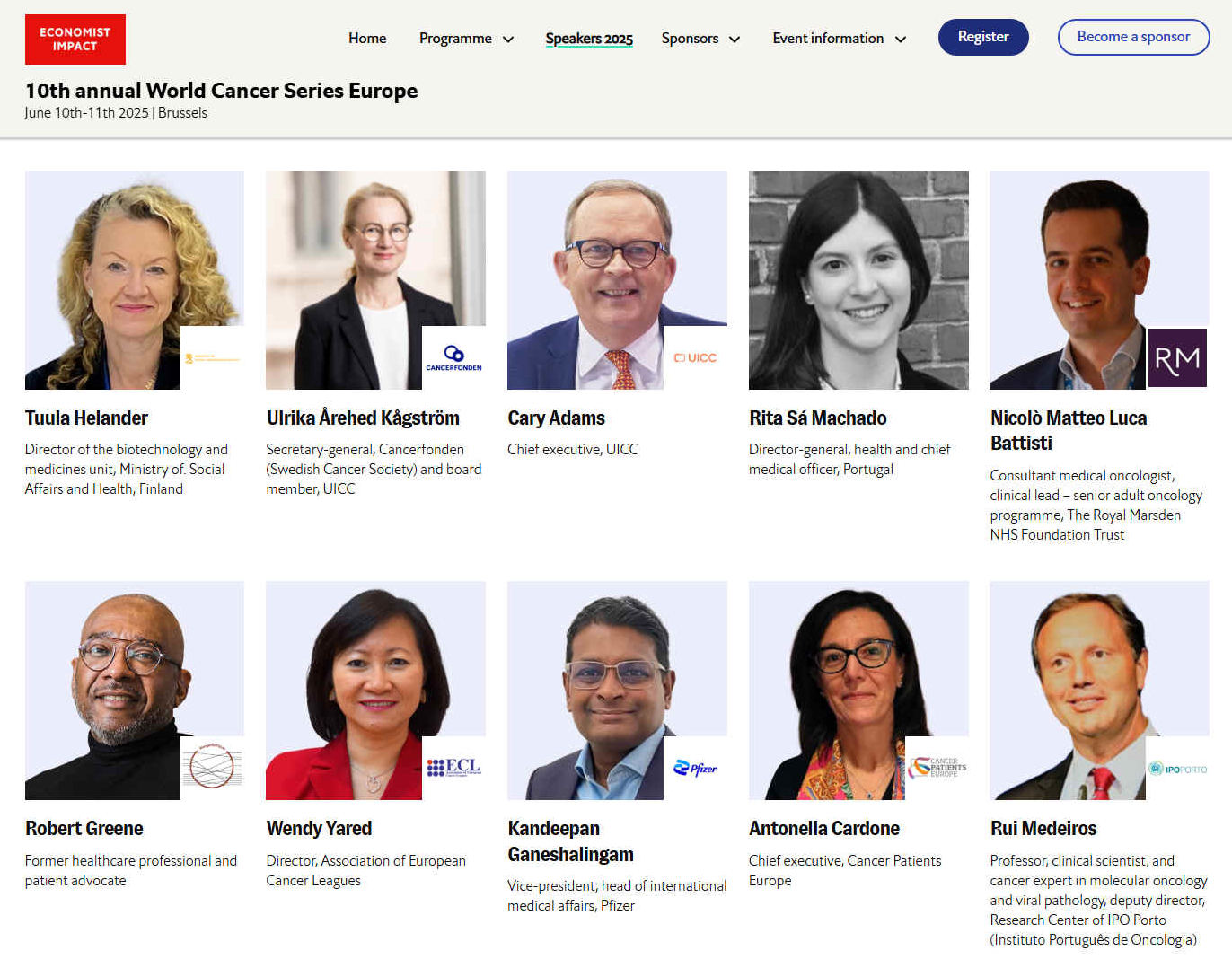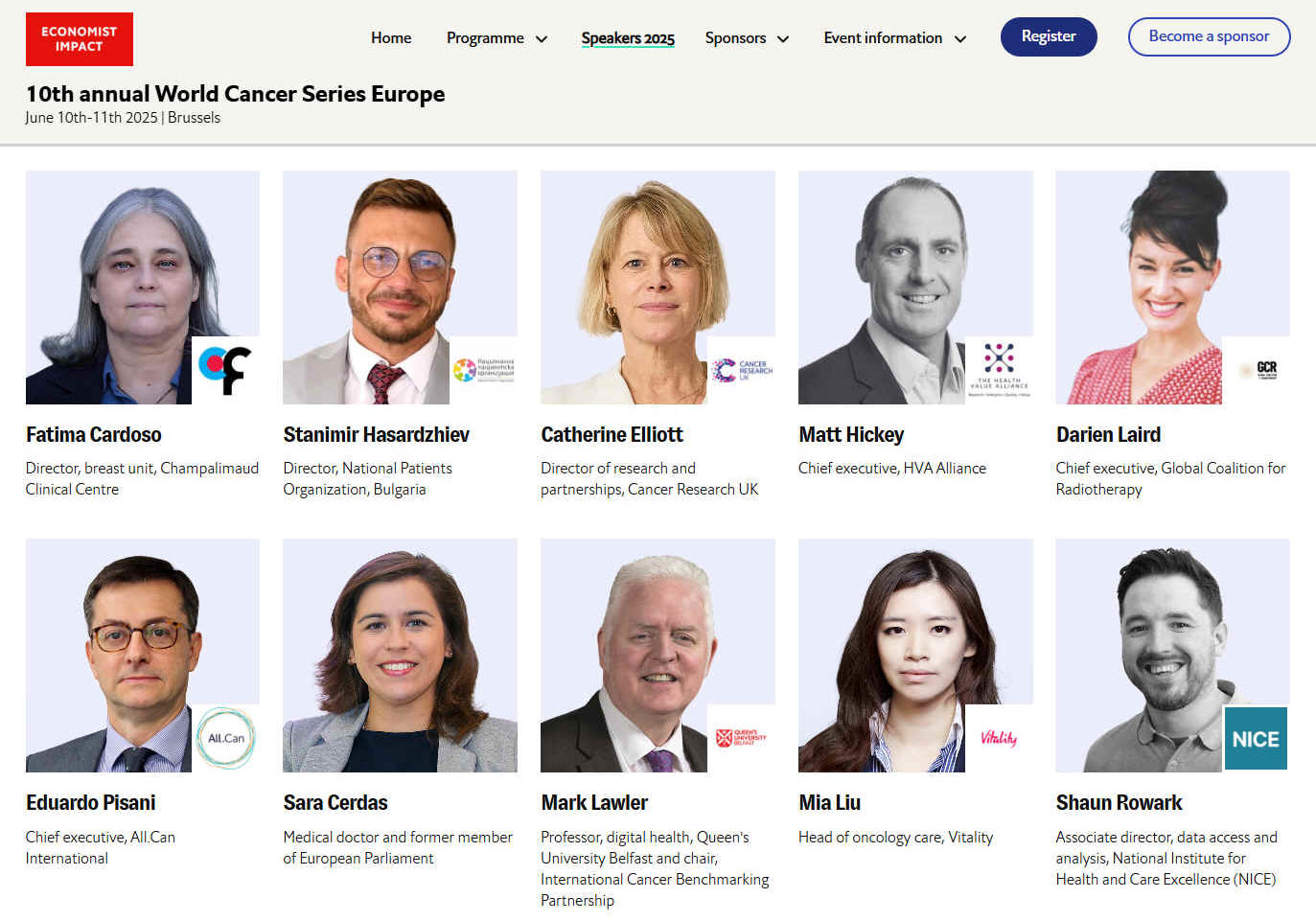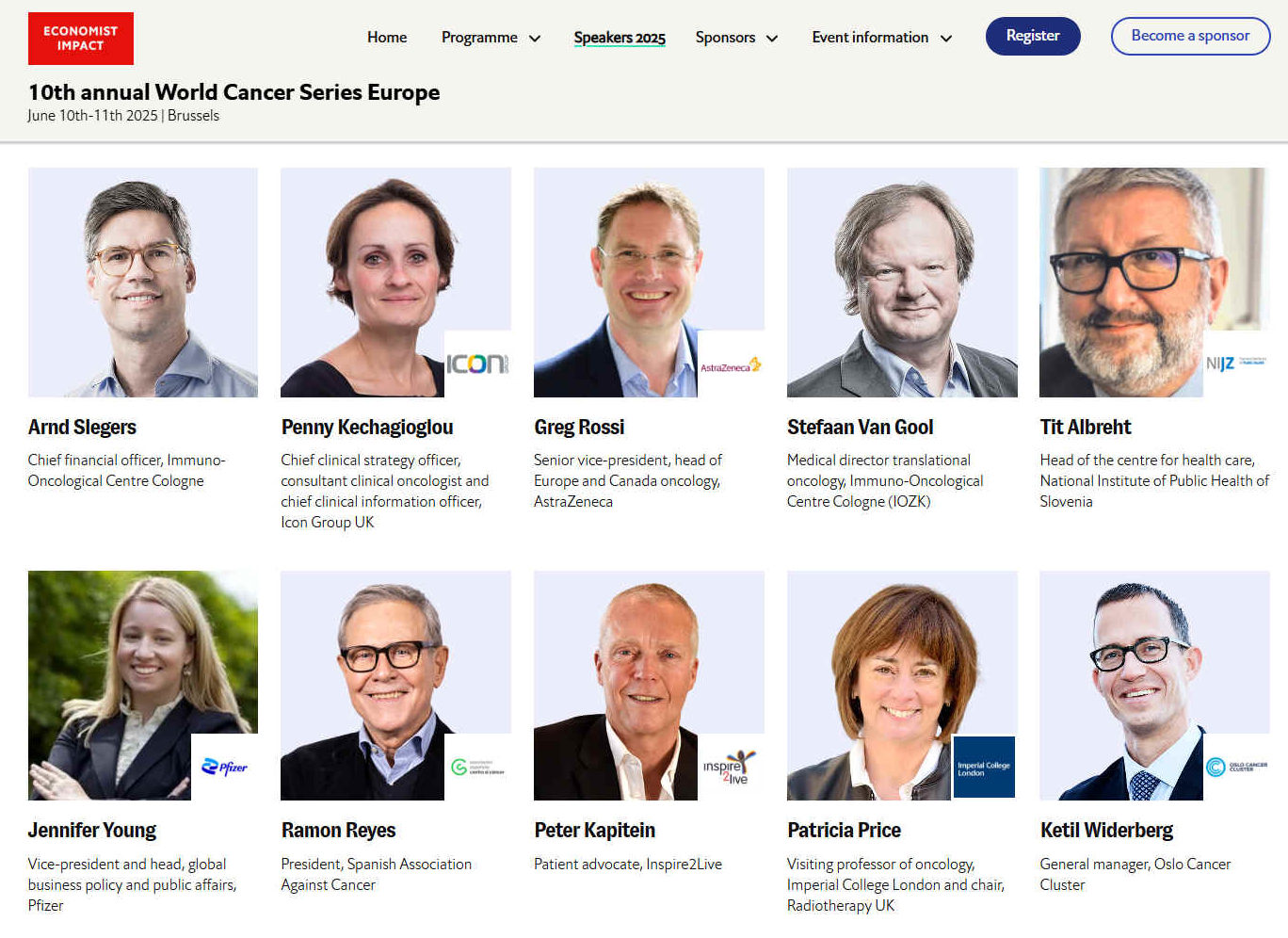|

SHAPING EUROPE'S CANCER-CONTROL AGENDA WITH TECHNOLOGY, DATA AND PATIENT FOCUS
Join in for the tenth anniversary of the World Cancer Series
Europe, where
you will celebrate previous successes in cancer
control - and help to map out a path for the future.
The Economist summit will convene over 80 speakers across more than 30 panel sessions, interviews, presentations and case studies. This year’s event will focus on inclusive access to care, a renewed commitment to patient care and better outcomes for all.
New for 2025: launch of the “innovation showcase” sessions that highlight technologies across digital healthcare, diagnosis and improving patient experiences.
AGENDA JUNE 10TH 2025 (DAY ONE)
The first day of the programme will begin with plenary sessions focusing on progress from the last decade, current priorities and the road ahead, emphasising the need for data-driven insights and solutions for cancer-control. The two tracks will cover specific cancers and
AI and digital applications, with sessions discussing women’s cancers, prostate cancer, how digital technologies are supporting cancer healthcare systems and launching the “innovation showcase” presentations.
13:35 CEST - Tuesday, June 10th
Presentation. Cancer control: a decade of progress and the road ahead
Over the past ten years, the development of Europe’s Beating Cancer Plan and national plans elsewhere marks impressive momentum matched by remarkable innovation. Yet Europe faces difficulties such as growing healthcare costs, legacy effects of the pandemic, migration and security concerns that add to the growing burden of cancer. What have been the achievements and setbacks
- and what should policymakers and healthcare providers do next?
13:50 CEST - Tuesday, June 10th
Keynote panel. Quantifying progress, highlighting priorities
Data-driven insights are required to measure progress in cancer care amid other
healthcare priorities. This discussion will focus on quantifiable metrics for assessing improvements in cancer care, addressing resource allocation and the role of sustained investment in comprehensive cancer-control strategies. Speakers will discuss the role of data-driven decision-making in shaping practices to optimise cancer prevention, diagnosis, treatment and survivorship support.
14:30 CEST - Tuesday, June 10th
Interview. Establishing Europe’s National Comprehensive Cancer Centres (CCCs)
14:45 CEST - Tuesday, June 10th
Panel. Implementing aspirations for cancer control
Solutions for cancer-control may take the form of policy and regulation, biotech and medtech innovation, digital health and
AI, R&D capacity and efficiency, and improvements in funding. Implementing these solutions are often expensive and time consuming. What are the next steps that need to be put in place to ensure cost-effectiveness and impact for the cancer ecosystem?
15:30 CEST - Tuesday, June 10th
Interview. The role of private insurance in cancer care across Europe
In many European countries, even those with universal public insurance, private insurance plays a critical role in providing cancer care. Some patients view private insurance as the only way to access certain diagnostic and therapeutic options, which leads to an increase in private-insurance membership. Private insurers must ensure that their cancer funds remain viable and commit to providing high-quality cancer care. This interview will discuss the role of private insurance in enabling high-quality care, and its future in cancer-care provision.
15:40 CEST - Tuesday, June 10th
Keynote interview. Frontiers in radio-oncology
In this keynote interview, we will be examining why radiotherapy needs to be a keystone inclusion within national cancer control plans. When aiming to improve access to radiotherapy, what are some practical and achievable recommendations and steps? We also examine the way that data collection and digital technologies are key to both greater access and exciting new treatment modalities, and how collaboration between countries is and has been critical to ensuring timely access.



The story of The Economist Group begins with the foundation in 1843 of The Economist newspaper by a Scottish businessman, James Wilson. A classical liberal, he successfully opposed the protectionist British Corn Laws. A belief in free trade, openness and the power of enlightened thinking to drive progress has inspired us ever since. It has paved the way to grow into a global—and increasingly digital—media company reaching a large, influential audience through our independent journalism and information services.
The Economist Group is a global media and information-services company that exists to champion progress. Our brands are The Economist, Economist Impact, Economist Intelligence and Economist Education. 9:05 CEST - Wednesday, June 11th
Panel. Measuring and acting on patient experiences
Improving cancer remission and survival is the primary goal of cancer care, but not the only one. Healthcare providers also aim to improve the outcomes and experience of patients. This session will examine how to have a patient-driven, comprehensive approach to innovation and care, and how to measure progress.
9:45 CEST - Wednesday, June 11th
Interview. A tale of two patients: the power of empowerment
“Patient empowerment” is a common term in health
care. But what does it mean in practice? This interview will describe what it means for a patient to take an active part in their care. It will examine how this contrasts with the experience of many patients who do not feel they have control over their treatment.
Peter Kapitein - Patient advocate, Inspire2Live
Eva-Maria Strömsholm - Patient advocate, co-founder and vice-chair, Gynecological Cancerpatients,
Finland
10:00 CEST - Wednesday, June 11th
Panel. Symptom control, supportive care and effective palliation
Cancer patients and their carers routinely identify unmet needs when it comes to the control of their symptoms, access to palliative care and attention to their wellbeing. These may arise from lack of investment, expertise and innovation. Other factors such as the financial burden of treatment, lifestyle decisions and psycho-social conditions such as a patient’s emotional state, coping mechanisms, social support networks and adjustment to the diagnosis and treatment of cancer are not regarded as responsibilities of traditional healthcare systems. This session will examine the extent of these unmet needs and how care can be improved
Networking break
10:45 CEST - Wednesday, June 11th
Presentation. Antimicrobial resistance (AMR) and cancer care
AMR is a grave concern in cancer care. Many patients require repeated hospitalisation, and may need surgery and other invasive procedures. Patients are often immunosuppressed and have a high risk of serious infection with resistant pathogens. This presentation will focus on the scale of the problem and how to counter it.
12:00 CEST - Wednesday, June 11th
Strategy session. Putting patients first: Enhancing national cancer control pathways
The European Beating Cancer Plan guides National Cancer Control Plans in member-states, aligning policy, allocating resources and promoting research. However, these plans vary in scope and priority, with some still undeveloped. Considering the complex political landscape, it is crucial to approach cancer control with a patient-centric focus. This panel examines improving these plans by addressing patient concerns, adapting to innovations in prevention, diagnosis and care, and ensuring sustainable resources for actions and policies.
12:00 CEST - Wednesday, June 11th
Panel. Bringing equity and inclusivity to cancer care
Inequalities in cancer prevention and care include disparity based on race, ethnicity, disability, gender identity, geographic location, income, education, age, sexual orientation and national origin. It is important to promote diversity, find cross-sectional solutions and foster a healthcare system that prioritises fairness and respect for all patients. This session will focus on plans to ensure individuals, regardless of their background, socio-economic status, or geographical location, have equal access to timely and high-quality cancer prevention, diagnosis, treatment and support services.
12:40 CEST - Wednesday, June 11th
Interview. Building inclusivity in trials, research and development
Broadening the diversity of clinical trials is essential for improving diagnostics, therapies and overall patient care. However there are significant barriers to improving trial inclusivity, notably costs and efficacy. This interview will examine what is being done by policymakers, patient-advocacy groups and industry to improve inclusivity across the R&D and trial pipeline.
12:45 CEST - Wednesday, June 11th
Strategy session. Tumour-agnostic paradigms
Historically, cancers have been treated principally on the basis of their anatomical location. More recently, some novel treatments are able to target cancers based principally on their molecular profiles, rather than on their anatomical sites. These treatments are called “tumour agnostic.” This session will explain why and how tumour agnostic treatments work, and explore the implications for the way these treatments are developed and approved, and ultimately, how they impact patient care and patient outcomes.
13:00 GMT - Wednesday, June 11th
Panel. How patient advocacy shapes cancer policies
Patient advocacy plays an important role in developing national cancer-control programmes, in guiding policy at EU level, and advising on health technology assessment. This interview will focus on building better feedback mechanisms, standardise patient experiences and how advocacy groups can be more impactful.
13:30 CEST - Wednesday, June 11th
Panel. Cancer prevention strategies
Prevention is a cornerstone of effective cancer control: The
European Commission estimates that 40% of cancers across the EU are preventable and has set out specific prevention targets within the Beating Cancer Plan. In this panel, we explore preventive strategies and their impact, and examine progress and gaps in prevention across Europe.
14:45 CEST - Wednesday, June 11th
Panel. How to sustainably fund optimal cancer control in Europe?
Sustainably funding cancer control involves long-term financial strategies ensuring resources for prevention, diagnosis, treatment, and survivorship. It includes investing in technology, infrastructure and workforce, prioritising efficiency and equity. This session will focus on how can public-private partnerships, philanthropy, and policy advocacy secure stable funding?
15:25 CEST - Wednesday, June 11th
Panel. Understanding value: how to achieve better control, care and costs?
The key factor to financial sustainability is the question of
value - that is, the benefit of the care that is offered in cancer systems compared with its cost. This interview will examine how different stakeholders view the concept of value, and how to agree on what good value in cancer care is.
15:35 GMT - Wednesday, June 11th
Innovation showcase. Improving outcomes, improving value
This quickfire series of short presentations will highlight technologies that are designed to improve the value of cancer care.
Speakers will answer three questions:
1. What are the innovative aspects of their technology or service design, and how are they intended to improve efficiency and value?
2. How has it been put into use?
3. What has been the demonstrable impact?
16:15 GMT - Wednesday, June 11th
Plenary workshop. Prioritising Europe’s cancer actions
This workshop session will harness delegates’ expertise and knowledge. Delegates will work in small groups and share with the full audience their responses to the following questions: - What is the highest priority and practicable action that healthcare professionals and governments in Europe must take in the next five years?
- Describe one thing that the World Cancer Series community could do to accelerate better cancer outcomes across Europe.
17:00 CEST - Wednesday, June 11th
Closing panel. Cancer and the big picture
Speakers will reflect on the conference and explore the global issues that will affect Europe in the next decade. They will discuss issues such as climate change, geopolitical instability, conflict and population displacement, global inequalities, ageing populations and how to prioritise cancer on political and financial agendas. The session will also propose plans of action for rising costs, incorporating AI and synthetic biology and preparing for the unknowns in the near future. CONTACTS Brussels Marriott Hotel Grand Place Rue Auguste Orts, Grand Place 3-7, 1000 Bruxelles, Belgium
+44 207 576 8000
If you would like to sponsor the event in 2025, please email Alice at
alicecalvert@economist.com
Discounts may be available for group registrations of three or more delegates. Please email us at events@economist.com for details.

In
our Cleopatra Reborn adventure, scientists develop a way to
clone and replicate humans from their DNA. Cloning is an
accepted method of duplicating animals. Replication is a
theoretical advance on cloning, but entirely possible. The
'New World' scientists also find a
way to enhance human performance, to include eradicating
faulty cancer genes, using a CRISPR virus delivery system.
Later, in another adventure, Dan Hawk and John Storm cure a
fictional Pope of stage 4 cancer.
OECD STUDY ESTIMATES HEALTH IMPACTS OF AIR POLLUTION - 22 May 2014
The OECD estimated the impacts of air pollution caused by road transport on people’s health.
The OECD, the Organisation of Economic Development and Cooperation, having as members 34 advanced economies, amongst which also the majority of EU countries, published a report estimating the costs of air pollution on health. The report focuses on air pollution caused by road transport and defines the costs in terms of human lives as well as economic costs of the health impacts of air pollution.
According to the study, outdoor air pollution kills more than 3.5 million people a year globally, far more than was previously estimated. Air pollution has been linked to a number of common diseases, such as cancer, heart diseases and respiratory problems (lung cancer). In most OECD countries, the death toll from heart and lung diseases caused by
air pollution is much higher than the one from traffic accidents. Air pollution in OECD countries has fallen in recent years, helped by tighter emission controls on vehicles, but it has increased in
China and
India due to the increasing number of vehicles in the two booming economies.
The OECD has estimated the cost of air pollution on health in OECD countries (including deaths and illness) at about USD 1.7 trillion (€1.2 trillion) in 2010. Evidence suggests that road transport is likely responsible for about 50% of this cost.
The OECD has also suggested a number of recommendations in its study for reducing the impacts of road transport on air pollution.
Some main recommendations include:
* Maintain and tighten regulatory regimes, in particular, vehicle standards regimes such as those currently in place in the European Union (see Polis article).
* Make test-cycle emissions more similar to the emissions the vehicles cause under normal use.
* Invest in more ambitious mitigation programmes, including improved public transport.
* Continue the research on the economic value of morbidity impacts of air pollution and on the specific evidence linking it to road transport.
* Mitigate the impact of air pollution on vulnerable groups, such as the young and the old.
PROACTIVE RESEARCH = FUNDING DISRUPTIVE INNOVATION
There can be nothing quite so traumatic as knowing you are being eaten away from the inside, without any hope of cure from modern medicine. Yet, through dedication and determination scientists are learning more and more about disease and how to fight back. We believe that if a cure cannot be offered, then the quality of life should be enhanced to enable sufferers to enjoy their remaining time in society. We also believe funding is vital for all forms of research which ultimately benefits mankind.
Just as with medical research to find a cure for cancer, we here at Max Energy are aiming to combat harmful airborne pollutants known to be carcinogenic. We are lobbying politicians around the globe for changes to protect and enhance our natural environment - to restore the balance that man's lust for profit is steering us (the human race) to a sticky end. In particular we favour a switch to clean energy for transport. One possible solution to marine pollution is a clean electric vessel, which is kind to marine life and humans.
INTERNATIONAL
AGENCY FOR CANCER RESEARCH
In
2013, the International Agency for Research on Cancer (IARC)
confirmed that outdoor air pollution is a cause of cancer.
Tiny dust-like particles just millionths of a metre wide,
called ‘particulate matter’, make up a part of outdoor
air pollution. The smallest particles known as PM10 and
PM2.5 are linked to lung cancers caused by pollution. It is
not fully understood how these particles can damage DNA in
cells and cause cancer.
The
dread and fear that can come with a cancer diagnosis have
their roots in its killer nature: It's the No. 2 cause of
death in Americans, second only to heart disease, according
to the Centers for Disease Control and Prevention. Even when
diagnosed early and attacked with the latest treatments, it
still has the power to kill.
To help raise money to find cures and treatments for cancer
patients, the "Stand Up to Cancer" telethon aired
on ABC, NBC and CBS and other networks and cable stations
starting in September 2010. The telethon feature a host of
celebrity guests, including George Clooney, Denzel
Washington, Renee Zellweger and Will Smith.
"'Stand Up To Cancer' represents collaborative
efforts" to provide funding for cancer research, Dr.
Len Lichtenfeld, deputy chief medical officer of the
American Cancer Society, is quoted as saying.
"We would not be where we are if basic and clinical
science wasn't funded," Lichtenfeld said. "Basic
science teaches us about mechanisms, about how drugs may be
effective, and we take that info and put it into a clinic to
find out whether or not those new ideas work in cancer
treatment."
While there are many successful treatments today that didn't
exist just a couple decades ago, a wholesale "cure for
cancer " remains elusive for many reasons. There are
more than 100 types of cancer, characterized by abnormal
cell growth. There are many different causes, ranging from radiation to
chemicals to viruses; an individual has varying degrees of
control over exposure to cancer-causing agents.
Cancer cells, and how they grow, remain unpredictable and in
some cases mysterious. Even after seemingly effective
treatments, crafty cancer cells are able to hide out in some
patients and resurface.
In 2010, about $200
billion had been spent on cancer research since the
early 1970s, and the five-year survival rate for all people
diagnosed with cancer in the U.S.
has risen from about 50 percent in the 1970s to 65 percent.
A
Anal Cancer
B
Bladder Cancer
Bone Cancer
Brain Tumors
Breast
Cancer
Bronchial Tumors (Lung Cancer)
C
Cardiac (Heart) Tumors, Childhood
Cervical Cancer
Colon
Cancer
D
Ductal Carcinoma In Situ (DCIS) - see Breast Cancer
E
Esophageal
(throat cancer)
Eye
Cancer
F
Fallopian Tube Cancer
G
Gallbladder Cancer
Gastric (Stomach) Cancer
Gastrointestinal Carcinoid Tumor
Gestational Trophoblastic Disease
H
Heart Tumors, Childhood
Hinkley,
California and PG&E
Hodgkin Lymphoma
I
Intraocular Melanoma
Islet Cell Tumors, Pancreatic Neuroendocrine Tumors
K
Kidney (Renal Cell) Cancer
L
Leukemia
Liver
Cancer
Lung
Cancer (Non-Small Cell, Small Cell, Pleuropulmonary Blastoma, and Tracheobronchial Tumor)
Lymphoma
M
Melanoma
N
Nasal Cavity and Paranasal Sinus Cancer (Head and Neck
Cancer)
Nasopharyngeal Cancer (Head and Neck Cancer)
O
Oral Cancer, Lip and Oral Cavity Cancer and Oropharyngeal
Cancer (Head and Neck Cancer)
Ovarian
Cancer
P
Pancreatic
Cancer
Penile Cancer
Prostate
Cancer
R
Rectal Cancer
Renal Cell (Kidney) Cancer
Research
S
Skin
Cancer
Stomach (Gastric) Cancer
T
Testicular Cancer
Throat Cancer (Head and Neck Cancer)
Thyroid Cancer
U
Urethral Cancer
V
Vaginal Cancer
Vulvar Cancer
W
Y

MEDIA
INDEX
BBC
NEWS - NETFLIX CLEOPATRA DOCUDRAMA 10 MAY 2023
BRISBANE
TIMES - RADAR REVEALS POSSIBLE LOCATION CLEOPATRA'S TOMB 2009
BRITISH
MUSEUM - CLEOPATRA,
17 YEAR OLD DAUGHTER OF CANDACE, THEBES
CBC
- CLEOPATRA OUTSMARTED EVERYONE, FEBRUARY 2021
CBS
- WHY
SOME EGYPTIANS ARE FUMING OVER NETFLIX'S BLACK CLEOPATRA
DAILY
MAIL - ADELE JAMES BREAK SILENCE AS TO BLACKWASHING CLAIMS MAY 2023
DAILY
MAIL - DEC
9 2024 KATHLENE MARTINEZ SEARCHING 20 YEARS MAKE SIGNIFICANT
FIND
DISCOVERY
MAGAZINE - JUNE
7 2023, WILL WE EVER FIND THE TOMB OF CLEOPATRA?
GREEK
CITY TIMES - ARCHAEOLOGIST CLAIMS TO BE CLOSE TO DISCOVERY OF CLEOPATRA
2021
LIVESCIENCE
- WHERE IS CLEOPATRA'S TOMB/PALACE JULY 2020
NATURE
- STUDY
90 MUMMIES REVEALS ANCESTRY ANCIENT EGYPTIANS: MIDDLE EASTERN JUNE
2017
ROTTEN
TOMATOES - CLEOPATRA
CRITICS, SERIES 1 REVIEWS MAY 2023
SKY
HISTORY - THE
HIDDEN TOMB OF CLEOPATRA MARCH 2023
SKYE
NEVILLE - PLASTIC FREE COMICS, WAITROSE BANS
SMITHSONIAN
- MORE
THAN HISTORIC SEDUCTIONS, REHABILITATED ELIZABETH TAYLOR, HOLLYWOOD ICON:
2010
SPECTATOR
- THE
TROUBLE WITH NETFLIX'S QUEEN CLEOPATRA 29 MAY 2023
THE
CONVERSATION - WHY
THE DISCOVERY OF CLEOPATRA'S TOMB COULD REWRITE HISTORY 2022
THE
GUARDIAN - NETFLIX, NO NEED FOR WHITE ACTOR 10 MAY 2023
THE
SUN - QUEEN CLEOPATRA'S TOMB, TAPOSIRIS MAGNA 2020
THE
SUN - THE REICH STUFF: GLOBAL HUNT FOR HITLER'S LOST £20 BILLION NAZI GOLD HORDE APRIL 2021
UNDERWATER
PHOTOGRAPHY GUIDE - CLEOPATRA'S SUNKEN PALACE
USA
TODAY - MUSTAFA
WAZIRI, ALEXANDRIA, EGYPTIAN ARCHAEOLOGISTS 2018
YOUTUBERS
- MAKEUP,
CLEOPATRA'S FACE & EYE COSMETICS, MUMMY MASK
YOUTUBERS
- NETFLIX VIDEO COMMENTS MAY 2023
ZAHI
HAWASS - DOCUMENTARY: CLEOPATRA VII PHILOPATOR
https://www.economistgroup.com/
https://www.economistgroup.com/
https://events.economist.com/world-cancer-series/
https://events.economist.com/world-cancer-series/

|






